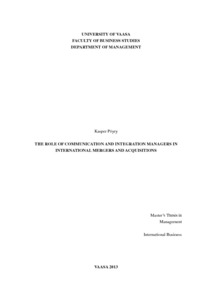The Role of Communication and Integration Managers in International Mergers and Acquisitions
Pöyry, Kasper (2013)
Kuvaus
Opinnäytetyö kokotekstinä PDF-muodossa.
Tiivistelmä
International mergers and acquisitions (M&As) are common expansive measures that provide companies with a unique set of opportunities but also challenges. The most critical part to the success of the M&A is often post-acquisition integration, where two companies come together and begin to create value. Integration managers facilitate the integration process with different roles and competences to ensure success. The main tools for integration managers are different means of communication due to the people-related approach and this produced communication is argued to have positive effect on the emotions of employees.
The aim of this thesis is first to argue what roles successful integration managers assume and what competences they need for that. Then the study presents arguments regarding how communication is likely to affect the emotions of employees. A framework is created to compile the most important communication roles and competences and to examine their argued effects on employees’ emotions. This theoretical framework is used as the foundation of the empirical study conducted in the form of a qualitative single case study of an international acquisition to explore the role of communication, integration managers and their effects on emotions of employees. The framework is compared with the empirical findings of the research and conclusions are drawn in order to seek theoretical generalization of the results.
The study reveals that the case company did not appoint an integration manager but several managers strived to act some of the recognized integration manager roles to facilitate the integration process and to produce communication. Signs of the merger syndrome were visible on the employees but the perceived managerial communication from the integration managers had positive effects on the employees’ emotions although not completely eradicating the merger syndrome. This study connects communication to integration managers more comprehensively, builds on existing theory and makes arguments that provide contribution to both research and practice.
The aim of this thesis is first to argue what roles successful integration managers assume and what competences they need for that. Then the study presents arguments regarding how communication is likely to affect the emotions of employees. A framework is created to compile the most important communication roles and competences and to examine their argued effects on employees’ emotions. This theoretical framework is used as the foundation of the empirical study conducted in the form of a qualitative single case study of an international acquisition to explore the role of communication, integration managers and their effects on emotions of employees. The framework is compared with the empirical findings of the research and conclusions are drawn in order to seek theoretical generalization of the results.
The study reveals that the case company did not appoint an integration manager but several managers strived to act some of the recognized integration manager roles to facilitate the integration process and to produce communication. Signs of the merger syndrome were visible on the employees but the perceived managerial communication from the integration managers had positive effects on the employees’ emotions although not completely eradicating the merger syndrome. This study connects communication to integration managers more comprehensively, builds on existing theory and makes arguments that provide contribution to both research and practice.
